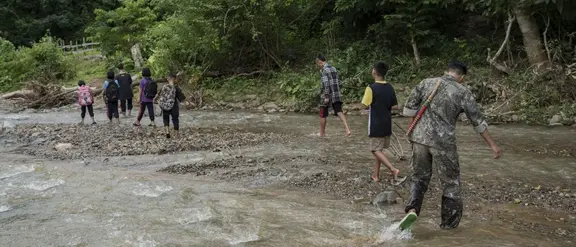Myanmar: Interview on the current situation
Four years have passed since a military junta seized power in Myanmar and triggered a civil war. In this interview, Thayet (name changed to protect her identity), who works on projects for Terre des Hommes in Myanmar, particularly along the border with Thailand, discusses current developments and hopes for the people of the country.
Thayet, you said, "The people will win." You told us that last year, with firm conviction: The coup government has no future, despite its military superiority, imprisonment, and torture. Where do you get this certainty from?
What we have witnessed in recent years differs from previous revolutions in Myanmar: Almost 100 percent of the civilian population is affected or involved in one way or another. Support from abroad is also greater overall.
It is evident that many ethnic armed groups and the People's Defence Force are successfully resisting the military. Both now control more than 100 cities. They are also already establishing governmental and administrative structures there, for example in Kachin, Karenni, and Karen states.
The junta appears to be acting with increasing repression and brutality. Nevertheless, it is losing control. How?
In many places, the junta's administration has collapsed. It also cannot control the flow of information: in more than 80 cities, it has attempted to cut off telephone and internet services and enforce widespread internet blocks. But people rely on satellite internet, which has become a kind of safety net for communication.
Media and social media play a crucial role in this war. News spreads rapidly, often proving particularly helpful to the civilian population. Many human rights organizations are also collecting data on human rights violations—unlawful attacks and killings, arbitrary detentions, and unfair trials. They will attempt to bring military leaders before international criminal courts.
What role does the international community play?
Pressure from the international community, including sanctions, is extremely important. Targeted sanctions are a crucial mechanism to stop the flow of money, weapons, equipment, technology, and kerosene to the junta – in order to take action against those responsible and to stop corruption and human rights violations.
The greatest threat to the people of Myanmar is airstrikes by the military junta. Many civil society organizations are trying to counteract this, in cooperation with the international community. Hopefully, there will be successes in 2025.
It is equally important to provide and coordinate humanitarian aid – including with neighboring countries. This is primarily for the millions of displaced people, the injured, and the victims of violence.
What can organizations like Terre des Hommes contribute? And how can Terre des Hommes ' partner organizations in Myanmar and Thailand help?
There are many ways to get involved: For example, there's advocating for a cross-border humanitarian aid program run by the Thai government for refugees and displaced persons. Political advocacy at the international level is also important.
Above all, they can provide on-site assistance, even if this involves risks for us and our organizations. Many of Terre des Hommes ' partner organizations in Myanmar bring vital aid such as food, medicine, and hygiene kits. They also provide psychosocial support and, where possible, education for the children.
They are also trying to secure and strengthen the protection of the civilian population, especially in areas controlled by ethnic armed organizations. And they are currently expanding humanitarian aid in cooperation with the elected government-in-exile and regional and state levels. This includes, in particular, the Interim Executive Council of the Karenni State and other representatives elected in 2020. In the partially self-governed areas, it is now crucial to facilitate a peaceful transition so that the population can once again have access to systematic administration and essential services.
<hr>
Explanation of terms:
- People's Defence Force (PDF): Armed units fighting on behalf of Myanmar's democratically elected government-in-exile.
- Ethnic Armed Organizations (EAOs): Militias that typically fight on behalf of a specific ethnic group. The vast majority are allies of the government-in-exile against the military junta.
Your contact person

Jan-Hinnerk Voss
Speaker for Donation Relations
